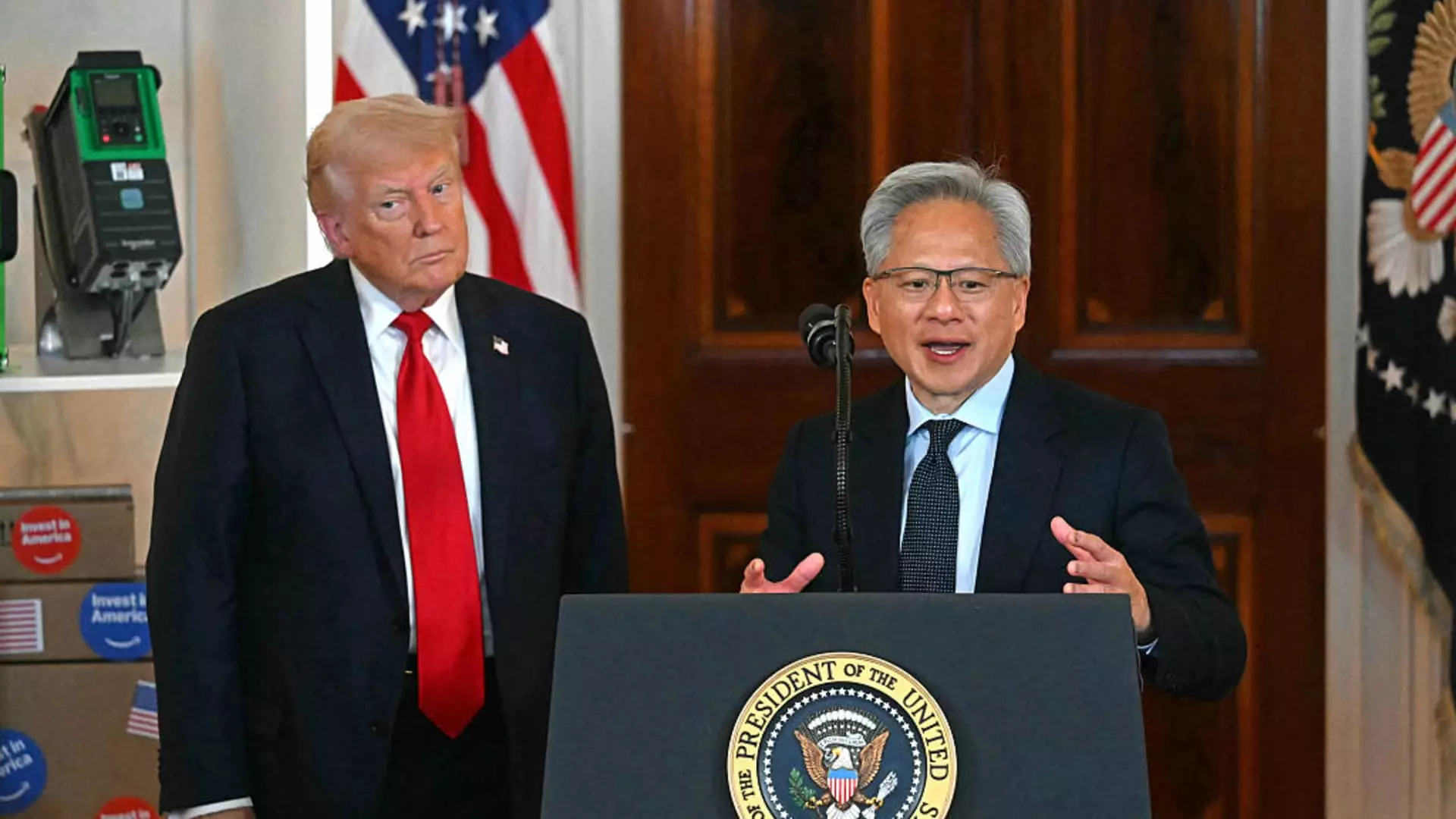In a world where technological dominance equates to geopolitical power, the decision to loosen export restrictions on advanced AI chips to China signals a dangerously shortsighted approach. The recent move by President Donald Trump, allowing Nvidia and AMD to sell high-end chips to China in exchange for a mere 15% revenue share, exemplifies a fundamental gamble with America’s future security and economic leadership. This supposedly strategic concession risks far more than monetary gains; it threatens to undermine decades of sustained investment in innovation and military supremacy. Suggesting that these chip sales are benign—simply an opportunity for revenue—ignores the complex web of security implications tied to technological proliferation in a rising global rival.
The core issue lies in the perception that the U.S. can afford to sacrifice its technological advantage for short-term fiscal benefits. Such a stance is naive and dangerous. The country’s leadership must recognize that AI technology, especially at the cutting edge, is a dual-use asset that can empower military applications and influence global power balances. By enabling China’s access to high-performance AI chips, we not only risk bolstering an authoritarian regime but also threaten the delicate strategic advantage that underpins America’s military dominance. This move exemplifies how political convenience and short-term economic incentives can cloud the judgment necessary for safeguarding national security.
Political Dissonance and the Lack of Accountability
The open letter from Democratic Senators reflects a rare moment of bipartisan concern—yet it is insufficient to counteract the administration’s reckless embrace of lucrative deals over national interests. Their call for a detailed explanation of the administration’s rationale indicates a recognition that decisions surrounding national security should not be driven solely by economic negotiations or diplomatic expediency. Instead, they should be founded on a clear-eyed understanding that technology restrictions are a strategic tool, not merely an obstacle to commerce.
What’s troubling is the ambivalence of corporate actors like Nvidia, who deny that their chips could aid military development, while simultaneously pushing for access to lucrative Chinese markets. This disconnect reveals a broader issue: the prioritization of profit over the security implications of technological proliferation. If companies and policymakers are only concerned with immediate bottom-line gains, they neglect the long-term consequences of enabling a rival nation to develop or accelerate military capabilities with advanced AI tools. The lack of decisive leadership to uphold export controls exposes a political environment susceptible to short-term lobbying pressures at the expense of strategic foresight.
The Illusion of Win-Win Scenarios
The narrative that allowing AI chip sales to China benefits America “by attracting developers worldwide and winning the AI race” is inherently flawed. It assumes an uncritical belief that economic engagement and technological openness are inherently positive, disregarding the nuanced reality where such openness can serve as a Trojan horse. When strategic assets are commodified and sold to adversaries, the supposed “win” for American interests becomes a hollow illusion—an illusion reinforced by corporate rhetoric and political complacency.
China’s response—urging companies to avoid U.S. chips—exposes a societal clash of interests. While the U.S. may be tempted to view market share expansion as a victory, China’s aggressive pushback signals a strategic prioritization of independence over American technological dominance. Here lies the stark truth: continued concessions could accelerate China’s self-sufficiency in critical tech, eroding America’s advantage and shifting the global balance of power. In this game of geopolitical chess, short-term profits risk sacrificing long-term security and influence.
The Center-Left Perspective: Balancing Innovation and Security
From a center-wing liberal stance, the issue isn’t anti-growth but a call for smarter, more responsible innovation policies. Ours is a nation built on the idea of strategic leadership not merely in consumption but in setting the technological agenda. Sacrificing this leadership under the guise of economic opportunity diminishes our influence and invites instability. It is essential to advocate for a balanced approach—one that recognizes the importance of fostering innovation but not at the expense of the core national interest.
Encouraging technological leadership requires investment and robust export controls, not reckless concession. The government must serve as a steward that actively promotes innovation while safeguarding critical assets from falling into the wrong hands. Such policies demand transparency, accountability, and an unwavering focus on America’s long-term interests—traits that seem increasingly absent in current decision-making processes driven by short-term geopolitical expediency.
The pursuit of global competitiveness should not come at the expense of our security infrastructure. Instead, it must be pursued with strategic caution and proactive oversight, ensuring that technological supremacy remains an anchor of American strength rather than a bargaining chip in diplomatic negotiations that prioritize profits over safety.


Leave a Reply